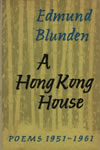
BD. Edmund Blunden
 |
144. A Hong Kong House: Poems 1951-1961. London: Collins, 1962.
A sequence running from page 20 to 37 is the most important late collection of Blunden poems on Japan. Other works (most notably 70, 71, and 160) collect Blunden’s occasional verse written in the country, but the poems here are serious confrontations both with Japan and with Blunden’s own poetics, the first collection about which this may be said since publication of Poems of Edmund Blunden (30) in 1930. Along with works noted below, reprints Summer Storm (71g), Flowers of the Rock (76a), Tokyo Lawn (79), Voice of Autumn (83), Threefold Screen (formerly Japanese Glimpses, 88), In Hokkaido (105), Voice of Spring (formerly For A Spring Dance by Tamami Gojo, 112), Tea House (formerly Japanese Inn, 122), Arrival at a River in Japan (124), and Japan Beautiful (143). See also 181.
a. The Stone Garden (KyOto). The ‘commotion’ of the modern world is contrasted with the quiet and calm of the dry landscape garden of the title, where the speaker pauses, to ‘see the soul which knows no wild extremes’. Reprinted in 157, 165, and 168.
b. Voice of KyOto. An unrestrained appreciation of Kyoto that contrasts the ‘inner tranquillity’ of the ‘blossom crowned’ old capital with the ‘many voices and contrarieties’ of ‘time’s current’. Reprinted in 157 and 165.
c. Japan Revived. The Occupation is not named, but the poem is dated 1953 and Japan is a ‘new lit ship . . . about to leave the moorings’. The speaker wishes ‘fair winds [to] attend her and her brave company’.
d. Nearing Yokohama. The speaker, ‘the greyest of the grey’, approaching Yokohama by ship, anticipates his arrival and remembers days in Japan ‘more than half a long life-span ago’. Blunden arrived in Yokohama aboard the French ship Viet-Nam on 15 August 1960, the date of this poem, to begin his fifth sojourn in the country. Reprinted in 165.
e. Pine-Trees. As in so many of Blunden’s early poems, a speaker calls to mind similarities between the natural landscapes of England and Japan, and as in so many of these later poems, scenes are lovingly recalled after the passing of many years. Here, late at night, images of the pines of Surrey and of an unnamed Japanese temple come to him, ‘music and breath of the branches / In some strange manner pass’, and he is comforted by thoughts of ‘the wisdom / of sunshine, and outings of fathers and mothers and children / Whose fancies perhaps can build / Far shrines under English pines’.

